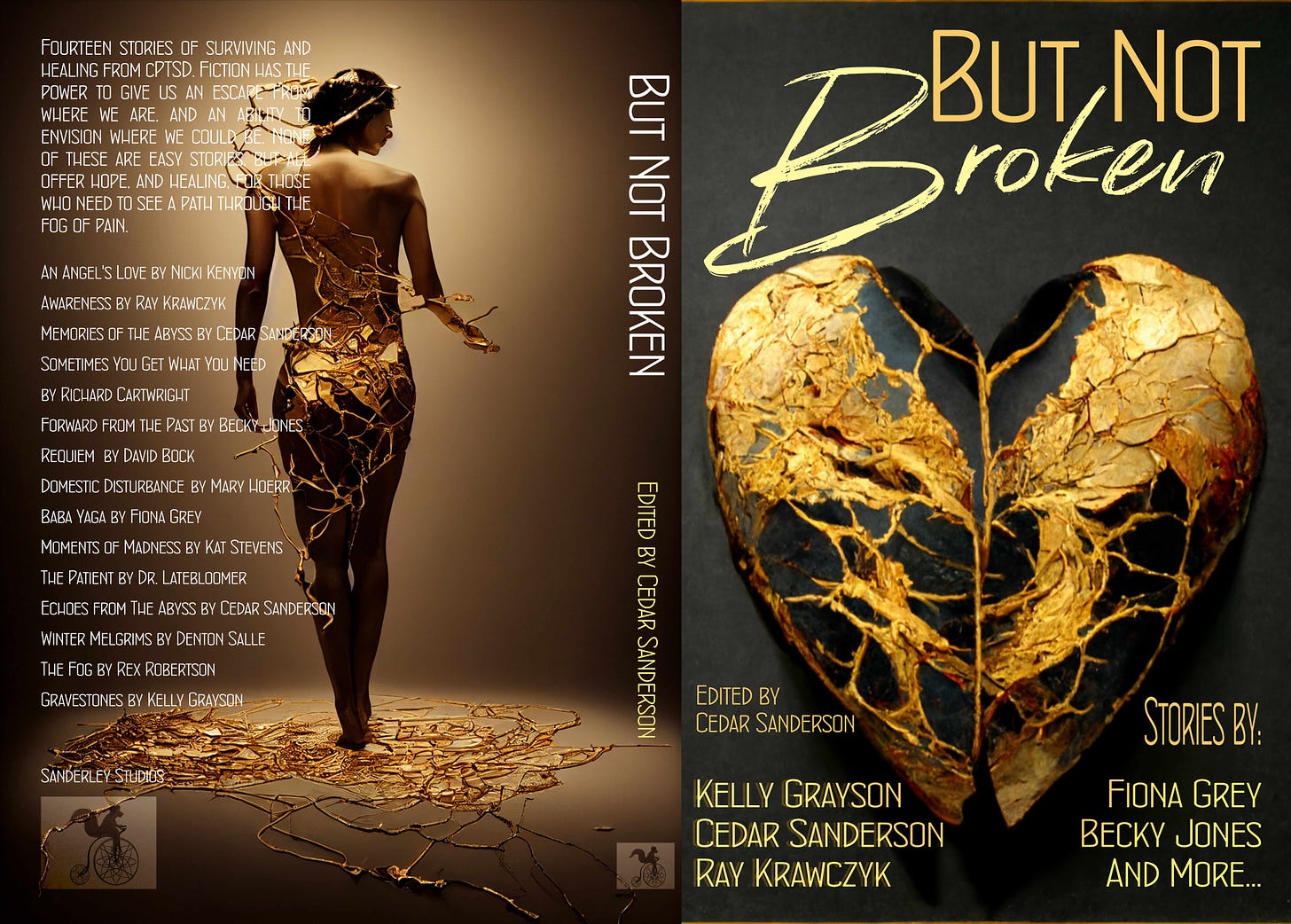It's going to be soon

But Not Broken is now available in ebook and paperback!
An Angel's Love Nicki Kenyon Awareness Ray Krawczyk Memories of the Abyss Cedar Sanderson Sometimes You Get What You Need Richard Cartwright Forward from the Past Becky Jones Requiem David Bock Domestic Disturbance Mary Hoerr Baba Yaga Fiona Grey Moments of Madness Kat Stevens The Patient Dr. Latebloomer Echoes from The Abyss Cedar Sanderson Winter Melgrims Denton Salle The Fog Rex Robertson Gravestones Kelly Grayson
Dear Readers,
This isn’t an easy essay to write. I have so much to say, and I know that most of you won’t even read this part. You’re here for the fiction, and that’s all right by me. That is, after all, the point of the anthology. To collect stories that deal with complex Post Traumatic Stress Disorder (cPTSD) and can, we hope, model a path to hope and healing for the readers. This is intended not only for those who deal with the fallout from trauma in their own lives, but who love and live with people who struggle. If we can help one of you, this is all worth it. It wasn’t an easy book to write, either. You’ll find stories here by masterful writers, and every one of them has a theme of pain, of loss, but the main thing, the thing that got them into this volume, was hope. Every one of these stories has hope at the end of it. Not a happy ending. That’s not always possible in life, and we all know that. Most if not all of the authors who wrote for this volume, and the first of the PTSD anthologies (as we refer to them most often), deal with mental health struggles in their own life. We’ve been touched by traumas, our own and others. We know there aren’t always happy endings. We also know that far too many lose their battles with their demons, and come to an unhappy ending far too soon. This is a tragedy. We are all the poorer when any one of you makes the unilateral decision that the world would be better off without you. I understand. I have been there, and I made that decision. It wasn’t, so much, a desire to die. It was, instead, a desire for rest. I was tired, and in a fog of unrelenting pain. There was no light. There was no hope. I wanted simply to lay down and never wake up, and I had no external support to remind me of my value. Instead, I had the poison poured into my ears daily that my world would be better without me in it. Those were lies. Horrible, horrible abuses of trust. I know, all too well, how it is to be in the abyss, trying to claw up from the darkness, and have someone stepping on my hands until they curled broken and painful, unable to crawl another inch. I was given another chance. In 2014 I wrote an essay about the ancient Japanese art of kintsugi (sometimes rendered kintsukori) and it’s analogy to the human psyche. I’m sure I’m not the originator of that concept, although I hadn’t seen it prior to writing that. I had, instead, been a student of art, pottery, Japanese art in particular, and pain. I was broken. I had been broken first when I was only six years old, and I was broken over and over, into smaller and smaller pieces, until what I had been, all my potential, was left unrecognizable. When a potter breaks a work in progress, it’s easy enough to smoosh wet clay back into a shapeless mass, before beginning again. Even dried clay can be dropped into water, and after a while, turned back into workable clay. A finished, glazed, piece of pottery is something that can endure almost unchanged for millennia. We are still unearthing pottery that last saw the rays of the sun thousands of years ago, the people who shaped it, who used it, long since turned to dust. An intact pot elicits much excitement in an archaeological dig, because they are so rare to find. Far more often, potsherds are what come to light. Pots break. They are inherently brittle. Most often, when a pot is broken and no longer useful, it is simply discarded. There is one place where the broken pot is not tossed aside, where the highest of arts, using the most precious of metals, is employed to turn a pedestrian household item into a beautiful metaphor. Kintsugi uses gold to piece back together all of the parts of the broken pot. We are not broken. We have scars, but they shine like gold against the dark soot of the fires we have passed through. We are mended, and in that strength, we find the resolution to carry on. We have found hope. For some of us, that hope came from deep beliefs. For others, it came to us with the love of a partner, a friend, family… even the kindness of a stranger might suddenly bring home our value. We endure, and we are not broken. In the stories that follow, I hope you will see a little glimmer of that hope that can light your path to healing, and become the gold that fuses you back together into a thing of beauty and art. You can have joy, you deserve it, and never let anyone tell you otherwise. Hugs, Cedar Sanderson




